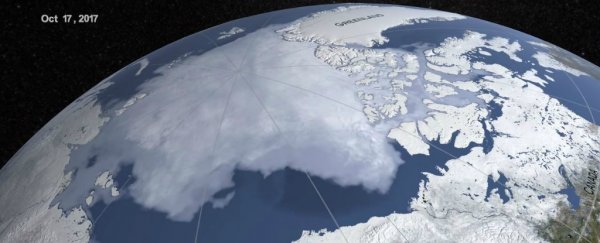We got second place, everyone! But this medal definitely isn't good - 2018 has just joined 2015, 2016 and 2017 as a year when the Arctic had the lowest sea ice maximum extents on record.
2018 actually comes in behind 2017, with this year's sea ice peaking at 14.48 million square kilometres (5.59 million square miles).
Now, that might sound like a lot, but this year's maximum extent was 1.16 million square km (448,000 square miles) below the 1981 to 2010 average maximum extent. We're talking the loss of an area larger than Texas and California combined.
But we don't need to just tell you how terrible this all is. NASA just released a video showing the increase and decrease of sea ice over the last six months, along with commentary by a NASA climate scientist, and honestly, it's rather terrifying.
"The Arctic sea ice cover continues to be in a decreasing trend and this is connected to the ongoing warming of the Arctic," said Claire Parkinson, senior climate scientist at NASA's Goddard Space Flight Centre in Maryland.
"It's a two-way street: the warming means less ice is going to form and more ice is going to melt, but also, because there's less ice, less of the Sun's incident solar radiation is reflected off, and this contributes to the warming."
There's only so much we can harp on about the effects of climate change, but the harsh reality is that the consequences we're seeing now are going to get worse.
The chemistry of the Arctic sea water is changing due to the temperature rise, bits of it are turning green, and the the region even went above freezing in the middle of winter earlier this year. And these are not just faraway, abstract problems.
The changes in ice levels and, as a consequence, changes in water chemistry, are changing the behaviour of Arctic plankton, which will have massive knock-on consequences up the food chain - including the food we rely on.
As climate scientist Katharine Hayhoe reminded us last year, "What happens in the Arctic doesn't stay in the Arctic. This entire planet is interconnected."
And despite all these events being caused by anthropogenic climate change, science shows we're still not working fast enough to stop the climate crisis from getting worse.
For now, we also can't say for certain how summertime ice will fare. "A lot will depend on what the wind and temperature conditions will be in the spring and summer," Parkinson said.
So all hope is not lost for the Arctic, but no matter how we try to curb our greenhouse gas emissions, the research says we need to act now.
